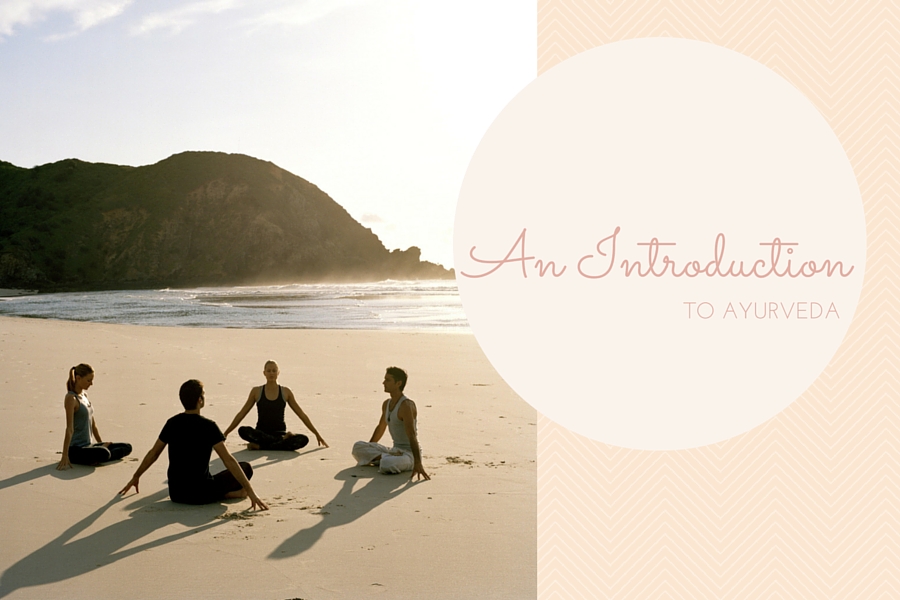I’m so excited to have my cousin Stephanie guest post on my blog today to introduce you to Ayurveda! Stephanie is a certified yoga teacher (200hr certified, 300hr training) through 108 Yoga in Halifax Nova Scotia in the tradition of Krishnamacharya (under Nancy Hunter), and an Ayurvedic Yoga Specialist certified through the Himalayan Institute (under Kathryn Chalfant Templeton and Sarah Guglielmi). She is currently an Ayurvedic and Yoga Specialist at The Floatation Center in Halifax.

Yoga and Ayurveda are sister sciences. Growing from common Vedic roots, they have long worked hand in hand as complimentary healing and wellness practices. They seek to bring us into balance on all levels, bringing physical health, mental health and, ultimately, spiritual health.
Yoga
In the west we often think of yoga as a series of poses (asana); an exercise, but really, it is so much more. Yoga is a spiritual science that not only addresses our physical bodies, but encompasses the realm of our senses, emotions, mind and spirit as well. It is foremost a science of self-realisation.
Much like mindfulness practices, yoga offers a direct means of stilling the natural turbulence of thoughts and restlessness of body that prevent us from knowing what we really are. There are many paths to take, and not everyone needs to start in the same place. Yoga is accessible to everyone, no matter what your physical capabilities or circumstances.
Yoga, roughly translated from Sanskrit, means ‘to unite.’ Though this is the most common translation I have seen, Desikachar’s translation of ‘to tie the strands of the mind together’ seems to me to be more satisfying. Yoga offers a way to bring our scattered selves into focused awareness; it works to integrate body, mind and spirit.
Ayurveda
Ayurveda is an alternative system of healing that has its roots in Ancient India. It is one of the world’s oldest holistic (whole-body) healing systems. Ayurveda is made up of two Sanskrit words: Ayuh which means life and Veda which means the knowledge of.
It places great emphasis on prevention and encourages the maintenance of health through close attention to balance in one’s life, right thinking, diet, lifestyle and the use of herbs. Knowledge of Ayurveda enables one to understand how to create this balance of body, mind and consciousness according to one’s own individual constitution and how to make lifestyle changes to bring about and maintain this balance.
Ayurveda identifies three basic types of energy or functional principles that are present in everyone and everything. Since there are no single words in English that convey these concepts, we use the original Sanskrit words vata, pitta and kapha.
The basic difference between Ayurveda and Western allopathic medicine is important to understand. Western allopathic medicine currently tends to focus on symptomatology and disease, and primarily uses drugs and surgery to rid the body of pathogens or diseased tissue. Many lives have been saved by this approach. In fact, surgery is encompassed by Ayurveda. However, drugs, because of their toxicity, often weaken the body. Ayurveda does not focus on disease. Rather, Ayurveda maintains that all life must be supported by energy in balance. When there is minimal stress and the flow of energy within a person is balanced, the body’s natural defense systems will be strong and can more easily defend against disease.
It must be emphasized that Ayurveda is not a substitute for Western allopathic medicine. There are many instances when the disease process and acute conditions can best be treated with drugs or surgery. Ayurveda can be used in conjunction with Western medicine to make a person stronger and less likely to be afflicted with disease and/or to rebuild the body after being treated with drugs or surgery.
We all have times when we don’t feel well and recognize that we’re out of balance. Sometimes we go to the doctor only to be told there is nothing wrong. What is actually occurring is that this imbalance has not yet become recognizable as a disease. Yet it is serious enough to make us notice our discomfort. We may start to wonder whether it is just our imagination. We may also begin to consider alternative measures and actively seek to create balance in our body, mind and consciousness.
This is where Ayurveda comes in. By treating symptoms before they become disease, we are able to live our lives healthier and more in balance.
To contact Stephanie for an Ayurvedic consultation contact her through her website or the Floatation Center.


Leave a Reply